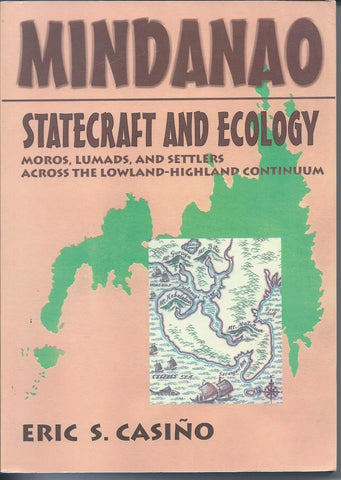
Mindanao Statecraft and Ecology: Moros, Lumads, and Settlers Across The Lowland-Highland Continuum by Eric S. Casiño
Share this Product
Out of print title.
We have no price. We offer a free Search Service for this title. Email us: LNL.philippinebookshop@yahoo.com if interested so that we can include your name in the list. When our Book Scouts are able to find the title, we will let you know accordingly. However, we can not guarantee when exactly it will be. Do not pay for your order first. Upon receipt of your email, we will check with the publisher if the book is still available, what is the new price, and when to expect delivery. This way, we can relay the particulars to you before you pay. Please note that if you pay and then cancel your order for one reason or another, PayPal has a 3.9% plus $0.15 fee that they charge us for every transaction. So, we would appreciate it if you just follow the instructions as stated here. This way, we will not pass on this fee to you should you cancel your order.
"Mindanao Statecraft and Ecology" offers a series of pioneering re-interpretations of ethnohistorical events and ethnographic patterns in the Cotabato-Sarangani region--the scene of sporadic bloody fighting between the Moro Islamic Liberation Front and Philippine government forces. The book explores heretofore unsuspected connections among such seemingly disparate historical events as Moro slave-raiding, the influx of land-hungry settlers, the highland territoriality and marginalization of the Lumads, and Moro autonomy movements. Slave-raiding need not be construed exclusively as religious wars between Christians and Muslims, as formerly argued by such historians as de la Costa and Majul. More recent scholars such as Warren and Laarhoven have shown new evidence that the capture and accumulation of slave manpower from the Visayas and other parts of the Malay world were economic and political enterprises motivated by pre-modern state formation in the Southern Philippines. Slavery was partly a function of statecraft. When slaves are viewed as one form of "strategic resources" harnessed for state-formation, once can trace connections between the importance of slave manpower and the importance of agricultural lands, timber, and minerals in Mindanao--all strategic embodiments of power and wealth. Such shifting forms of strategic resources define the competition among political and economic groups motivated by state ideologies. with photographs and maps.
Publisher : Notre Dame University (January 1, 2000)
Language : English
Hardcover : 356 pages
ISBN-10 : 9715553540
ISBN-13 : 978-9715553544



"We do not have an inventory of this title. This title is subject to order. If interested, email us: info@philippinebookshop.com but do not pay for your order first. Upon receipt of your email, we will check with the publisher if the book is still available, what is the new price, and when to expect delivery. This way, we can relay the particulars to you before you pay. Please note that if you pay and then cancel your order for one reason or another, PayPal has a 3.9% plus $0.15 fee that they charge us for every transaction. So, we would appreciate it if you just follow the instructions as stated here. This way, we will not pass on this fee to you should you cancel your order."